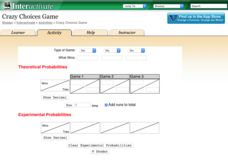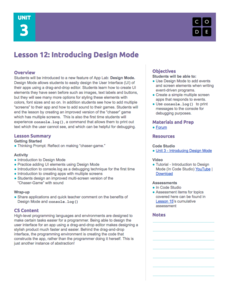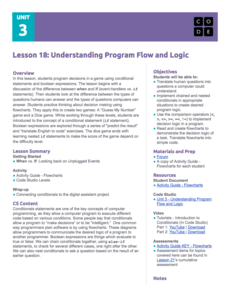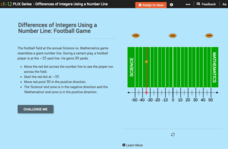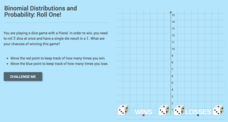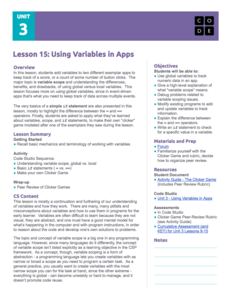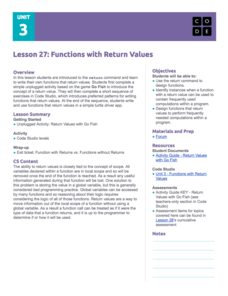CK-12 Foundation
Sums of Integers with Different Signs: Board Game
Five questions challenge scholars to show what they know about integers. Using an interactive board game, learners move pieces to discover where a player landed, then answer problems involving both positive and negative integers.
Code.org
Star Wars: Building a Galaxy with Code
Welcome to the code side. The interactive lesson introduces coding in a game format with familiar characters. Young computer experts learn to develop code to control the interaction of the characters in the game. The activity ends with...
Shodor Education Foundation
Crazy Choices Game
Wanna take a chance on which game is best? The resource provides three games of chance using multiple types of games. Games range from coin toss to cards. Choosing a type of game, pupils determine what wins and enter the theoretical...
CK-12 Foundation
Expected Value: Game of Chance
Determine whether the payoff is worth it. Pupils calculate the expected value of a game with three different payoff levels. Each level has a different probability of winning money. The scholars find the expected payoffs for each...
CK-12 Foundation
Mutually Inclusive Events: Card Game
Find probabilities of pulling cards. Using a Venn diagram, individuals sort five cards along the rules of a game. The pupils calculate compound probabilities using the information from the diagram. Initially, the interactive provides the...
Code.org
Introducing Design Mode
Move beyond buttons when designing user interfaces. In the fourth installment of a 21-part unit, young computer scientists learn to apply design mode, which gives users options for colors, fonts, etc. They learn to incorporate these...
Code.org
Beyond Buttons Towards Apps
Explore how people use event-driven programming in games with a lesson plan that teaches scholars to use new screen elements and events. They apply these new elements to create a simple chaser game.
Code.org
Understanding Program Flow and Logic
Explore decision-making logic in programming computer games. The 10th installment of a 21-part unit teaches scholars how to apply conditional statements and Boolean expressions. They use these concepts to create a "Guess My Number" game...
Shodor Education Foundation
Life
How does life evolve? The interactive provides a simulation based on the Game of Life invented by mathematician John Conway. Users can run the applet with the preset rules and settings or adjust them to view whether overpopulation or...
CK-12 Foundation
Discrete Random Variables: Roll the Dice!
And the winner is ... not always who it appears to be. An interactive gives the directions for a dice game that on the surface gives one player an advantage over the other. Pupils look closer at the possible outcomes and find the...
CK-12 Foundation
Numbers with Decimal Place Value: Battleship Decimals
Decimal place value is the topic of a Battleship themed-interactive. Scholars answer five questions—multiple-choice and true or false—while referencing a grid that acts as the board game. The practice concludes with a discussion...
Shodor Education Foundation
Racing Game with One Die
Pupils roll a die to figure out which car advances on a race track. They determine the rules for each car moving forward and, given the statistics of the winner, compare if it matches their predictions.
Microsoft
Arrays
Zoos are just elaborate arrays. Scholars learn the meaning of arrays and how to create them in Minecraft. Applying this knowledge, they write a program to create a zoo within the game's world. They also complete an independent project...
CK-12 Foundation
Differences of Integers Using a Number Line: Football Game
Make football a math sport! Move the football player (red dot) along the sideline (number line) to see how many yards (positive and negative integers) they've traveled to the other team's end zone.
CK-12 Foundation
Conditional Probability: Game Show with Monty
The car is behind door one — no wait, it is behind door three. An interactive allows learners to visualize the Monty Hall problem. Pupils work through the probabilities of choosing the car with their first pick. Next, they determine...
SurfScore
Kodable
Prepare young scholars for life in the twenty-first century with this introduction to computer coding formatted as a fun problem solving game, this resource is a great way to develop children's sequential thinking...
CK-12 Foundation
Expected Value: Creating a Discrete Probability Distribution Table
Wanna roll the dice? Determine whether it is a good idea to play a dice game. An interactive presents the rules for a game of dice. Pupils find the probabilities of each event and calculate the expected value of the game. They finish...
CK-12 Foundation
Expected Value: Playing Darts
The expected payoff is right on target. An interactive resource provides a dart game scenario with amounts of cash prizes and probabilities of winning. Learners calculate the expected value and expected payoff for the game. To...
CK-12 Foundation
Mutually Exclusive Events: Lemon Roulette!
You first! An interactive sets up a game between two friends who hope they don't find a lemon hidden under a tray. Pupils determine whether there is an advantage of going first. Individuals find the probabilities of each friend finding...
CK-12 Foundation
Binomial Distributions and Probability: Roll One!
It takes exactly one to win. Pupils calculate the probability of rolling five dice and having only a single die come up with a one. Learners calculate the number of expected wins out of a series of games. The interactive provides...
CK-12 Foundation
Vector Projection: Hitting a Baseball
Hit a home run with a resource that is all fun and games. Learners apply an interactive to determine the horizontal component of the distance a baseball travels. They must consider vector projections for this task.
Shodor Education Foundation
Graph Sketcher
Sketch graphs with the Graph Sketcher. Scholars graph functions on a coordinate plane. An interactive makes it as easy as inputting the function and clicking a button.
Code.org
Using Variables in Apps
Investigate the benefits of using global variables. The seventh installment of a 21-part unit continues the study of variables from the previous lesson. Young computer scientists modify two existing apps by adding variables and learn how...
Code.org
Functions with Return Values
Young computer scientists explore how to use the return command in computer programing by playing Go Fish. They learn about functions that return values and then write a turtle driver app using the return function.


